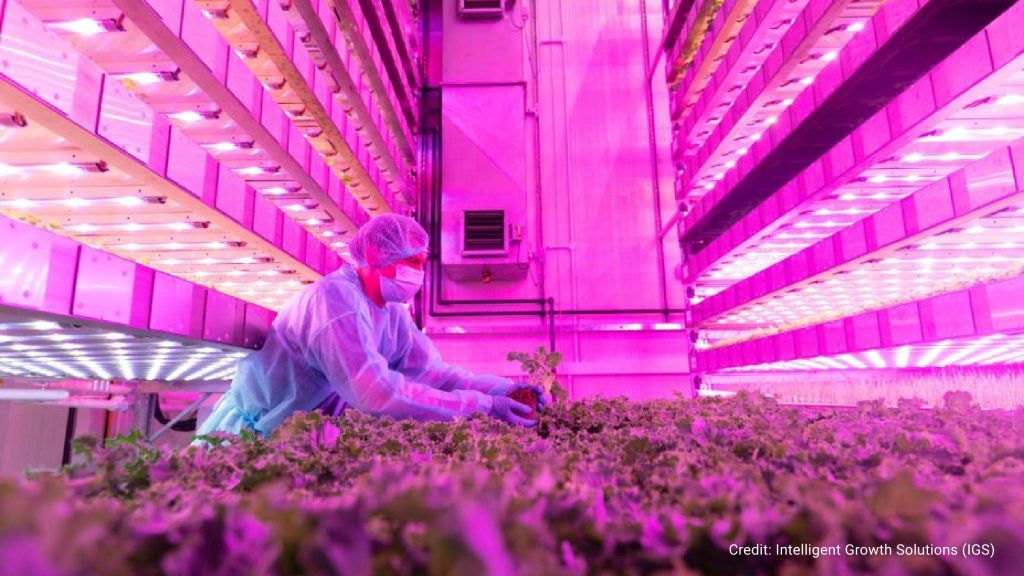
As a collaboration between well-known vertical farming companies, the GigaFarm is set to revolutionize Dubai’s food production through a circular waste-to-value system.
- Using its vertical farming systems, the GigaFarm aims to produce up to three million kilograms of various produce annually.
- Utilizing advanced technology, the facility transforms waste streams into valuable agricultural products.
Dubai’s colossal vertical farm, dubbed “GigaFarm,” may redefine food production with a circular waste-to-value system.
The indoor agricultural facility is not the first of its kind for the region. In 2022, the city revealed the world’s largest vertical farm, a 31,000-square-meter facility at Al Maktoum International Airport. The facility can produce over one million kilograms of leafy greens annually. However, the GigaFarm may trump it in size.
This ambitious project, a collaboration between vertical farming companies ReFarm and Intelligent Growth Solutions (IGS), may produce up to three million kilograms of various produce each year with its 12-meter-high, 83,612-square-meter facility.
It’s a vertical farm. So, what would normally grow out of the ground would grow out of a wall. It also uses state-of-the-art technology to transform waste streams – such as food scraps and sewage – into valuable agricultural products like compost, animal feed, clean water, and energy.
This circular model has two main benefits. One, it reduces waste. And two, it reduces the carbon footprint of food production. Two very important points in fighting climate change. To achieve this, six complementary technologies will work synergistically to maximize resource efficiency. Black soldier fly larvae will recycle food waste on-site, yielding organic compost for traditional agriculture, animal feed, and water for the vertical farming towers. Other on-site technologies will handle the ammonia sulfate from wastewater. It will be used in plant fertilizers and produce organic biodegradable polymers to support crop growth in arid regions.
The initiative is part of Dubai’s plan for Food Tech Valley, a comprehensive development effort focused on advancements in food production and food security measures.
Dr. Thani bin Ahmed Al Zeyoudi, the UAE Minister of State for Foreign Trade, said at the time of the announcement, “Rethinking our food production systems is a clear priority, and the decision of ReFarm to launch a facility in Dubai’s Food Tech Valley is a significant step forwards for the development of a technologically advanced, low-carbon agricultural sector. ReFarm’s mission to make farming autonomous, self-sufficient and sustainable is very much in line with our goal to use innovative techniques to meet our food needs.”
Construction of GigaFarm is slated for later this year, with full operational capacity expected by 2026.
The GigaFarm is a remarkable project in a water-scarce region. It aims to replace 1% of the UAE’s food imports. But will it be a mirage, only existing in the hot desert?
Such a project comes with a hefty price tag. A price that the UAE is more than capable of paying, no doubt. But that’s not the reality for several countries that suffer from food security. So, can such a high-tech solution translate to developing nations facing far greater food security challenges?
Inside Telecom provides you with an extensive list of content covering all aspects of the tech industry. Keep an eye on our Tech sections to stay informed and up-to-date with our daily articles.